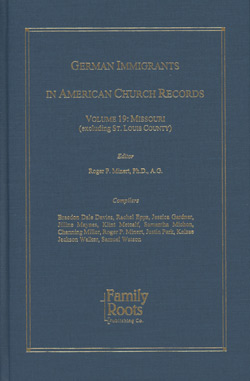The following book review was written by Bobbi King:
German Immigrants in American Church Records
Volume 19: Missouri (excluding St. Louis County)
By Roger P. Minert. (Orting, WA: Family Roots Publishing Co.). 2016. 761 pages.
 Roger Minert is a masterful and prolific author, organizer, compiler, and teacher of German genealogy. This prodigious series of volumes alone would earn him a magnificent gold star on the Genealogy Walk of Fame—if there was one. (I nominate the plaza and sidewalk in front of the Family History Library.)
Roger Minert is a masterful and prolific author, organizer, compiler, and teacher of German genealogy. This prodigious series of volumes alone would earn him a magnificent gold star on the Genealogy Walk of Fame—if there was one. (I nominate the plaza and sidewalk in front of the Family History Library.)
Eighteen years ago, at Brigham Young University, Mr. Minert assumed professorship for the department of Germanic family history. For his students enrolled in the course on German paleography (the study of ancient writings and inscriptions), Mr. Minert required that they study and extract data from German-language documents of certain American churches.
Their first practicals examined the American Protestant—principally Lutheran—church records of Indiana congregations populated by predominantly
German immigrants. The church pastors, commonly themselves of German background, were already familiar with church ledgers and forms pre-printed in the German (Gothic) typefaces, into which they hand-wrote the names of parishioners and the dates of the church events using the native German script notation they had learned and used in Germany.
These particular records are difficult to read and decipher for the novice researcher who has no background nor study in the German and Latin old-style texts and scripts. The BYU students interpreted and extracted the data of all persons possibly born in the Germanic areas of Central Europe, especially those church record entries that indicated the names of ancestral towns of origin, a potentially sole and very important resource for a family researcher.
The church records project expanded to include the states of Wisconsin, Nebraska, Iowa, Illinois, Michigan, Minnesota, North Dakota, South Dakota, and Missouri. These many volumes can be found on the Family Roots Publishing website where they are described in detail.
I looked at Volume 19: Missouri (excluding St. Louis County) where I found no Catholic church records; listed are predominantly Evangelical Church, Lutheran Church, and Reformed Church congregations. There is a huge every-name index including 5879 surnames. There are 18,563 entries from 68 churches and 25 counties. This volume is the first of seven volumes for records in the state of Missouri.
Some examples from the Appleton City Trinity Church, Appleton City, St. Clair Co., Missouri:
Albert Finke b. Lichtenstein, Sachsen (kingdom) 13 June 1877; son of Ernestine Finke. Ref: pp. 74-75.
Johanna Steffens b. Bremervörde, Hannover 31 March 1877; dau of Henrich Steffens and Elisabeth Wieselhahn. Ref: pp. 74-75.
Adelheid Steffens b. Barchel, Bremervörde, Hannover; dau of Hinrich Steffens and Elisabeth Wiesehan. Ref: pp. 76-77.
Dorothea Schumacher b. Germany 29 July 1891. Ref: pp. 82-83.
Anna Maria Radell b. Baden (grand duchy); dau of Johannes Radell and Friederike - -; m. Appleton City, MO 14 November 1869, Johann Friedrich Breitwieser. Ref: pp. 130-131.
Jacob Koenig b. Unterniebelsbach, Württemberg; son of J. Koenig and Regine Bodemann; m. Appleton City, MO 15 July
Mr. Minert informs me that when the project began, he excluded the Catholic church records as they rarely mentioned German home towns. Now, with their current project in Kentucky, Catholic church records are being included in the search. But by far the greatest number of Catholic entries have only “Germany” as an immigrant’s place of origin. Nevertheless, Catholic records will be included from now on as their project continues.
Such an epic work!
The editor, compilers, students, and publishers have shaped a remarkable legacy.
German Immigrants in American Church Records Volume 19: Missouri (excluding St. Louis County) by Roger P. Minert is available from the publisher, Family Roots Publishing Co., at https://bit.ly/3hREQ4z. The ISBN number is 978-1-62859-093-7.
 Latest News Articles
Latest News Articles If you do not see a Plus Sign that is labeled "Add comment," you will need to upgrade to either a (FREE) Standard Edition or a (paid) Plus Edition subscription
If you do not see a Plus Sign that is labeled "Add comment," you will need to upgrade to either a (FREE) Standard Edition or a (paid) Plus Edition subscription  Do you have an RSS newsreader? You may prefer to use this newsletter's RSS feed at:
Do you have an RSS newsreader? You may prefer to use this newsletter's RSS feed at: